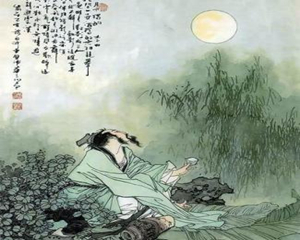《鹊踏枝·谁道闲情抛掷久》是五代十国时期南唐词人冯延巳的词作。此词以细腻、敏锐的笔触,描写闲情的苦恼不能解脱。上阕紧扣首句提出的复杂矛盾的心情回环反复,表现内心感情的痛苦纠结;下阕进一步抒发这种与时常新、难以排解的闲情愁绪。全词语言清丽流转,感情深致含蓄,写尽了一个“愁”字。

冯延巳·《鹊踏枝·谁道闲情》
谁道闲情抛掷久,
每到春来,
惆怅还依旧。
日日花前常病酒,
不辞镜里朱颜瘦。
河畔青芜堤上柳,
为问新愁,
何事年年有?
独立小楼风满袖,
平林新月人归后。
To "Ch'üeh T'a Chih" (II)
Feng Yen-ssu
Who would have thought a carefree heart could be cast away for ever?
Ever year when spring arrives,
Sorrow and remorse abide unchanged.
In bygone days beside the blossoms I was always drunk on wine;
Oh, to avoid the mirrors in which my rosy face grows thin!
Green weeds by river banks, willows on the dikes—
And yet I wonder at new sorrow;
On what account does it arise, year after year?
Standing alone on a tiny pavilion, the wind billowing my sleeves,
And a new moon above the wooded plain after everyone has gone home....
(Daniel Bryant 译)
Tune: Magpie on the Branch
Feng Yansi
Can melancholy, oh! Be laid for long aside?
When comes spring tide,
It will renew.
I'm sick of wine each day with flowers fair in view,
How can a mirrored rosy face not change its hue?
Over the riverside green grass sway willow trees.
I ask why should grief new
Oh! Come from year to year.
I stand alone on lonely bridge with sleeves full of breeze,
When men are gone, the wood sees the new moon appear.
(许渊冲 译)
更多精品翻译素材,敬请关注可可英语。












